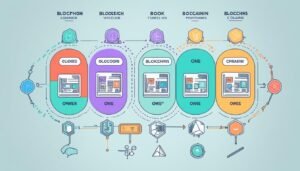Blockchain technology is changing the game in many areas, especially in business. It uses decentralization and transparency to make big changes. This is true in finance, supply chain, and healthcare.
In finance, blockchain makes transactions safe and quick, cutting costs and building trust. Supply chains get better with clear and traceable steps, making consumers trust more and work more efficiently. In healthcare, blockchain helps solve big problems like keeping medical records safe and making sure medicines are real.
Key Takeaways
- Blockchain makes finance and supply chain safer, cheaper, and more transparent.
- Healthcare uses blockchain for secure patient records and clear supply chains.
- Projects like MediLedger help prove medicines are real, fighting fake drugs.
- Blockchain gives businesses a new way to work without one main boss, spreading power out.
- Using blockchain in healthcare protects patient privacy and helps manage data better.
Transforming Financial Transactions: Blockchain Use Cases and Benefits
Blockchain technology is changing how we handle money. A February 2023 survey by EY found that 38% of US workers say blockchain is already a big deal in their companies. Also, 44% think it will be everywhere in three years.

Companies are using blockchain to make financial transactions faster and safer. This cuts down on costs and speeds up transactions. It also makes sure transactions are secure, open, and traceable, which adds value to the money involved.
JPMorgan’s Onyx unit is leading the way in using blockchain in finance. They’re creating new ways to make transactions faster and safer. By 2030, blockchain could save banks billions, cutting costs by over 11% on international transactions, says Jupiter Research. Ethereum is also a big player, offering big cost savings over old tech.
Here’s how traditional and blockchain-based finance compare:
| Aspect | Traditional Systems | Blockchain-Based Systems |
|---|---|---|
| Transaction Time | 2 to 7 days | Real-time |
| Cost | High (up to 6.94%) | Reduced by over 11% |
| Transparency | Low | High |
| Security | Variable | High (immutable ledgers) |
| Efficiency | Manual processes | Automated, streamlined processes |
Retailers and luxury brands like Tiffany & Co. and Gucci are exploring blockchain too. They’re using NFTs to connect with tech-savvy customers and show who owns what. Blockchain helps prove that luxury items are real, building trust in the resale market.
In summary, blockchain is making finance more open, cheaper, and efficient. It’s changing the industry, promising a future where data is safe, reliable, and easy to get to.
Enhancing Supply Chain Efficiency with Blockchain Traceability Solutions
Blockchain technology is changing how businesses manage their supply chains. It makes tracing products easier and faster. This is especially true for industries that use a lot of resources and the healthcare field. Seven big U.S. companies are now looking into how blockchain can make their supply chains better.

Using blockchain helps businesses keep track of their products better. It makes sure all information is clear and can’t be changed. For example, a study found that seafood was often mislabeled up to 87% of the time. Blockchain can fix this by keeping records that can’t be changed, making products more authentic.
Blockchain also helps buyers, suppliers, and banks work better together. When trusted partners work on a blockchain network, it lowers the risk of fake products or mistakes. This is very important for industries with valuable or sensitive products.
- Predicting supply chain risks.
- Enabling ESG tracking through blockchain traceability in supply chain.
- Enhancing trust in complex, multi-stakeholder environments.
Blockchain technology can solve some big problems in the supply chain. It helps reduce risks, makes things more visible, and builds trust. Deloitte is working on using blockchain to make supply chains better through investments and working with clients.
| Benefit | Description | Impact |
|---|---|---|
| Enhanced Traceability | Improved ability to track the origin and journey of products. | Reduces counterfeiting and ensures product authenticity. |
| Better Coordination | Streamlined communication among stakeholders. | Leads to faster, more efficient transactions. |
| Transparency | Creation of a tamper-proof data ledger. | Builds trust and accountability within the supply chain. |
Blockchain is already making a big difference in how supply chains work. As more companies use blockchain, we might see a big change towards being more open, green, and saving money. Gartner predicts that Chief Supply Chain Officers will start using this tech for real-time data sharing. This will make supply chains more efficient and strong worldwide.
Blockchain solutions for businessesare not just ideas for the future. They are already being used and could change how supply chains work. With strong examples and predictions of growth, blockchain technology is set to make supply chains better, more open, and reliable.
Leveraging Blockchain for Secure Financial Record-Keeping Processes
Blockchain technology is changing the financial world. It makes financial record-keeping secure, transparent, and efficient. By 2024, blockchain will bring new security and transparency to many industries.
Blockchain makes financial records unchangeable and clear. This means data can’t be altered once it’s in the system. This builds trust and security. Using blockchain in DeFi makes transactions faster and cheaper by cutting out middlemen.
Blockchain automates and digitizes transactions. This leads to quick, secure deals and helps grow capital markets. Its decentralized nature keeps data safe and consistent, stopping unauthorized changes.
Blockchain is great for keeping records safe and true in finance and insurance. For example, it helps with cryptocurrency insurance by making policy actions automatic through smart contracts. This makes things more efficient and clear.
Here is a comparison showing how blockchain helps financial processes:
| Traditional Financial Processes | Blockchain Financial Processes |
|---|---|
| Manual data entry prone to errors | Automated data entry through smart contracts |
| High operational costs due to intermediaries | Reduced costs by eliminating intermediaries |
| Slow transaction times | Real-time transaction settlements |
| Privacy and data security concerns | Enhanced security and privacy through cryptographic methods |
| Opaque transaction histories | Transparent and auditable transaction records |
Using blockchain for financial records is changing the financial world. It boosts security, trust, and efficiency. By using blockchain fully, financial institutions can ensure data safety, streamline operations, and gain trust in the digital economy.
Top Blockchain Solutions to Revolutionize Supply Chain Logistics
Blockchain technology is changing the game in supply chain logistics. It offers solutions to big industry problems. For example, $140 billion is stuck in payment disputes daily, and companies wait 42 days to get paid for their work. Blockchain industry solutions can make these processes much faster.
Blockchain is growing fast in logistics. It was worth $1.48 billion in 2023 and could hit $75.40 billion by 2030. This shows how important blockchain is for making supply chains better and more efficient.
The pharmaceutical industry is one big winner with blockchain. It helps keep medicines safe and follows strict rules. Companies like IBM and Walmart use blockchain to make food safer. This shows how blockchain can change things for the better.
Blockchain doesn’t just change logistics; it also fixes big problems. Things like paperwork can make costs go up to 20%. But blockchain, with smart contracts, can make things run smoother and faster.
Research shows a projected Compound Annual Growth Rate (CAGR) of 48.25% for the Blockchain Supply Chain Market from 2023 to 2032.
Blockchain also helps use trucks better. Trucks drive 29 billion miles a year with nothing in them. With over 1,400 companies wanting to use blockchain, it’s clear many see its value. It can make fleets work better and cut waste.
| Metric | Statistics |
|---|---|
| Pending Blockchain Applications (as of 2018) | 1,400 |
| Projected CAGR (2024-2029) | 49.87% |
| 2024 Market Size Estimate | $0.84 billion |
| 2029 Market Size Estimate | $6.31 billion |
Blockchain is making a big difference in logistics. It’s key for blockchain innovations in logistics. It’s helping make supply chains better, more open, and reliable. Blockchain is changing the game in many ways, from making things more efficient to cutting costs.
Securing Healthcare Data: The Role of Blockchain Technology
Blockchain technology is changing healthcare by offering strong ways to keep blockchain healthcare data secure. With Blockchain 3.0, its decentralized and trustless features are key in protecting sensitive health info. A big data breach in 2018 showed 13 million records, proving we need better security fast.
Many successful blockchain projects in healthcare show its power. For example, blockchain helps manage electronic medical records, keeping data safe and in control. It also helps in the drug supply chain to check if drugs are real and stop fake ones. These examples show how blockchain can be used in many ways in healthcare.
Blockchain makes data safer by spreading it out and cutting down on data breaches. It helps keep health data safe and whole. Smart contracts in health insurance make claims faster and more open. Blockchain also changes how we monitor patients remotely by keeping IoT device data safe.
Experts say the blockchain market in healthcare will grow by 2022. This is because of worries about data breaches and the need for a secure, change-proof way to manage data. Adding blockchain will bring top-notch security and privacy, keeping patient info safe in our digital world.
Blockchain Innovation in Financial Services: Latest Trends and Insights
The financial services industry is going through big changes thanks to blockchain technology. This technology is making the market grow fast, from USD 2.2 billion in 2022 to a huge USD 93.3 billion by 2032. This growth is expected to be around 45.6% every year from 2023 to 2032.
Blockchain is changing how finance works by making it more decentralized. This means less control by a few big companies. North America is leading the way with over 43% of the market in 2022. The Asia-Pacific region is expected to grow the fastest, at about 47% a year.
Decentralized Finance (DeFi) is a big part of this change. It’s expected to grow from USD 20.22 billion in 2023 to over USD 398.77 billion by 2031. DeFi uses blockchain to offer new financial services that are cheaper and faster.
Security tokens are also becoming more popular. They’re expected to grow by about 81% a year from 2021 to 2026. Europe is seeing a big increase in Security Token Offerings (STOs), which could make the market reach €918 billion by 2026.
Artificial Intelligence (AI) is also playing a big role in finance. The finance industry is using AI more than any other, with over 30% adoption. Robo-advisors are a good example of this, with the market growing by 8.06% a year to reach $2.27 billion by 2027.
| Market Segment | Projected Growth (2023-2032) | Key Statistics |
|---|---|---|
| FinTech Blockchain Market | CAGR of 45.6% | From USD 2.2 Billion to USD 93.3 Billion |
| Asia-Pacific Region | CAGR of ~47% | Remarkable growth forecasted |
| DeFi Market | From USD 20.22 Billion to USD 398.77 Billion | Substantial growth anticipated |
| Security Tokens | Growth rate of 81% per year (2021-2026) | Market to surpass €918 Billion by 2026 |
| Robo-advisors | Annual growth rate of 8.06% | Market volume of $2.27 billion by 2027 |
In conclusion, blockchain technology is changing finance in big ways. It’s making things more transparent, efficient, and secure. The mix of blockchain, AI, and smart contracts is creating new, fast, and open financial services.
Implementing Blockchain for Transparent Supply Chain Operations
Blockchain technology is changing how we see transparency in supply chains. It keeps a clear record of every step from the start to the end user. This tech helps protect against fake or low-quality products. It also makes sure companies follow the rules, which is key in managing today’s supply chains.
The blockchain supply chain market was worth $2.08 billion in 2024 and is growing fast. It’s expected to reach $9.77 billion by 2030. This shows how important blockchain is becoming in many areas. Companies like De Beers and Walmart have used blockchain to track products, prevent fakes, manage inventory, and make payments easier.
Transparent blockchain operations make things cheaper and more efficient from start to finish. They cut out middlemen, saving money and boosting speed. For example, tracking shipments in real-time, keeping secure records, and making payments automatically makes things smoother and clearer.
Using smart sensors and RFID tags helps track goods better. This makes tracing products easier and more accurate. Companies like Acropolium have been using AI, ML, IoT, and blockchain for over 10 years. They show how these technologies can make logistics better.
Blockchain is also being used in sectors like retail, finance, and healthcare, not just for cryptocurrency. In supply chains, a special kind of blockchain is used. Only certain people, like those in a group, can see the blockchain. This makes it safer and builds trust among everyone involved.
But, there are challenges with blockchain in supply chains, like complexity and security worries. Yet, companies are finding ways to overcome these issues. For example, Acropolium uses blockchain, smart contracts, and IoT to make things clearer, traceable, and more efficient.
The following table shows some key points and benefits of blockchain in supply chains:
| Aspect | Benefit |
|---|---|
| Supply Chain Visibility | Increased transparency and real-time monitoring |
| Cost Reduction | Elimination of intermediaries and decreased administrative overhead |
| Regulatory Compliance | Enhanced adherence to regulations through secure audit trails |
| Product Integrity | Protection against counterfeits and assurance of product authenticity |
Overall, blockchain technology is a game-changer. It brings many benefits, making supply chains more transparent and modern.
Blockchain Adoption in Healthcare: Improving Patient Privacy and Data Security
The rise of blockchain adoption in healthcare is changing how we handle patient records. Solutions like Medicalchain and BurstIQ lead the way, offering complete, single-source records for patients. These solutions let patients control their data while keeping it very secure.
Blockchain technology is becoming more popular in healthcare, focusing on improving patient data security. It stores data in a way that makes it hard for hackers to get to it. Once data is on the blockchain, it can’t be changed, keeping it safe and trustworthy. Only people who are allowed can see the data.
Smart contracts help make things run smoother and keep patient info private. Blockchain benefits in healthcare go beyond just keeping data safe. They help make sure medical records are full and accurate. This helps doctors give better care that’s tailored to each patient.
Blockchain also helps solve the problem of different health systems not talking to each other. It brings together data from various places, giving patients more control over their health history. This helps them make better health choices. Blockchain also helps with medical research by sharing patient info without revealing personal details.
In today’s world, keeping patient info private is very important. Groups like the MediLedger Project use blockchain to make sure medicines are real and safe. Smart contracts can also make things like paying for care easier and cheaper.
Using blockchain with AI and IoT could make health care better by improving data analysis and care models like telemedicine. Even though there are challenges like making different systems work together, blockchain could change healthcare a lot. It could make sure data is safe, help different systems talk to each other, and build trust with patients.
| Benefits | Examples |
|---|---|
| Data Security | Decentralized storage, encryption techniques |
| Patient Privacy | Access control, patient data management |
| Interoperability | Unified data sources, comprehensive patient records |
| Efficiency | Automated claims processing, smart contracts |
| Innovation | AI, IoT integration in telemedicine |
Financial Inclusion Made Easy: Leveraging Blockchain Technology
Blockchain technology is changing how we handle money, making financial systems clear and safe. It helps people get more control over their money. For example, Rahat uses mobile blockchain to send aid in a clear and cost-effective way.
In Kenya, Kotani Pay helps people without bank accounts by moving money using blockchain. It makes it easy to switch between digital and local money with just a phone. This is a big step towards fixing financial gaps.
Impact Market gives a basic income to those in need, thanks to the Celo Foundation Blockchain. This shows how blockchain can really change the economy for the better.
In Africa, Boss Money offers banking online without needing the internet. The UNHCR in Switzerland uses Cardano blockchain to send money to Ukraine. These are just a few ways blockchain is making financial services better for everyone.
Blockchain makes things more open and safe, like Building Blocks by the WFP. It helps with sending aid and keeping track of who gets it. Syrian refugees can buy groceries by scanning their eyes, no cash needed.
Even traditional banks are using blockchain to be more secure and efficient. JPMorgan Chase Bank is one example. The banking industry is seeing big benefits from blockchain, with a market size expected to hit $22.5 billion by 2026.
Blockchain helps make financial records safe and trustworthy. It also makes identity checks more secure, making banking safer and easier for everyone.
The rise of blockchain in finance shows its power to include more people in the economy. It creates systems that are efficient and clear, helping those who were left out before.
Conclusion
In this article, we’ve looked at how blockchain is changing many sectors. It brings new levels of security, transparency, and efficiency. Blockchain’s secure and clear records make things safer and work better in many areas.
Blockchain is a big help in the finance world. It cuts costs, lowers risks, and makes settling transactions clear. Things like CBDCs and DeFi are changing how we handle money. They make transactions faster and get rid of middlemen, helping more people have access to finance.
It also makes supply chains better by tracking products from start to finish. This builds trust and makes things more efficient for everyone involved.
Healthcare gets better with blockchain by keeping patient data safe and true. Digital identities protect against identity theft. In real estate, smart contracts make things automatic. In energy, blockchain helps manage and track renewable energy better.
Blockchain is also changing logistics, protecting creative work, and helping schools keep records safe. Governments in places like the Netherlands and Estonia are using it for public services. For more info on blockchain use, check out LeewayHertz. Using blockchain fully could lead to big changes in many areas, making things safer, clearer, and more efficient for everyone.
FAQ
What are some blockchain use cases in business operations?
Blockchain changes the game in many business areas, like supply chain, finance, and healthcare. It cuts down on fraud, makes things more transparent, and speeds up transactions. This makes everything more secure.
How is blockchain technology applied in finance?
In finance, blockchain makes transactions safe and quick. It keeps records clear and can’t be changed. This helps fight fraud. Companies use it to save money and work better by cutting out middlemen and automating tasks.
What are some real-world applications of blockchain in the supply chain?
Blockchain in the supply chain means you can track things, check if they’re real, and share data fast. For example, it helps stop fake drugs in the pharmaceutical world. Big names like IBM and Walmart use it to make food safer and work better.
How does blockchain enhance financial record-keeping processes?
Blockchain makes keeping financial records better by making them safe and clear. It spreads out data management to cut down on data tampering risks. This means faster access to financial info, building trust and making financial work smoother.
What are some top blockchain innovations in supply chain logistics?
Big wins in blockchain for supply chains include MediLedger for checking drug realness and AI for guessing demand. These tools track things better and build trust with customers.
How does blockchain help secure healthcare data?
Blockchain keeps healthcare data safe by storing and sharing it in a way that’s hard to hack. It helps protect patient info and keeps data true. It also uses smart contracts for insurance claims, making things safer.
What are the latest trends and insights in blockchain for financial services?
Blockchain in finance is all about making things clear, quick, and safe. New tech like crypto and AI gives people more control over their data. This means better data handling and more ways to participate in the economy.
How is blockchain implemented for transparent supply chain operations?
Blockchain makes supply chains clear by keeping a detailed record of what happens to products. It stops fake goods and helps follow rules. This new way of managing supply chains is faster and more secure.
What benefits does blockchain adoption bring to healthcare for improving patient data security?
Blockchain keeps patient data safe by making medical records unchangeable and secure. Tools like Medicalchain and BurstIQ give patients full control over their health info. This boosts privacy and security.
How does blockchain facilitate financial inclusion and economic empowerment?
Blockchain opens up finance to more people by making records clear and giving users control. It cuts out middlemen for direct transactions. This helps people who were left out before and makes financial management secure and clear.











